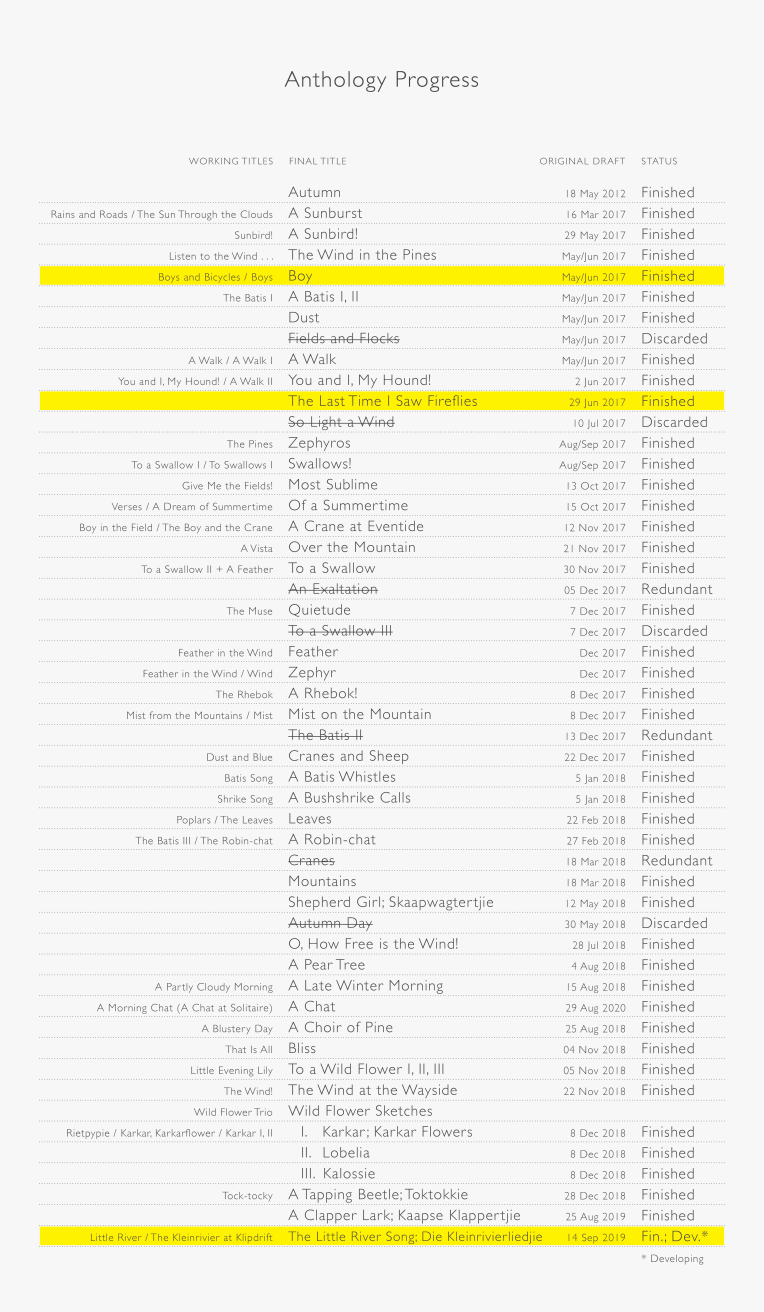I apologise for the inconvenience, but links in posts are currently broken due to a recent URL change from .co to .co.za. Kindly add .za after .co in the address bar as a temporary solution. I shall correct this as soon as I can.
To think that one agonises for weeks or months over what will be read or recited in a moment. A poet can but hope it is the sweetest moment in a reader’s life, echoing in his soul for a lifetime thereafter.
Editing the Poems
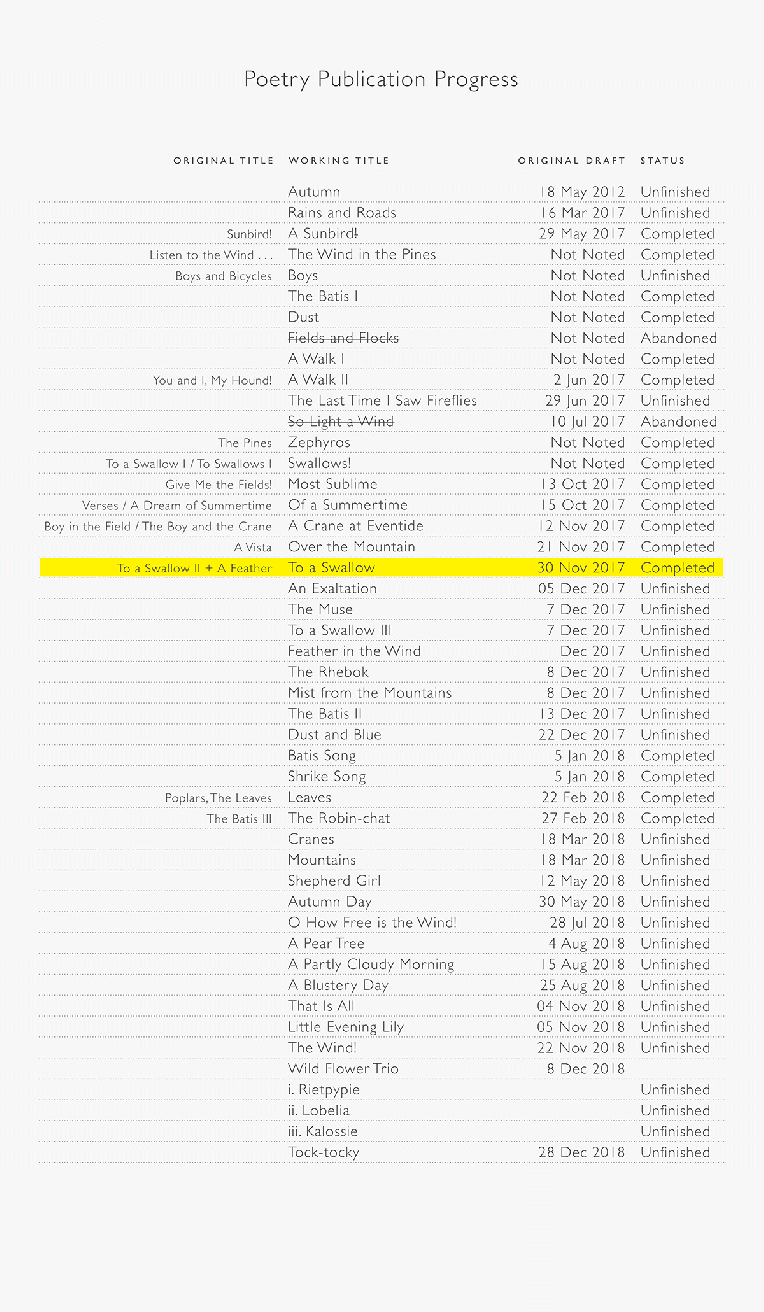
I have officially begun the process of editing the anthology, bringing to an end the composition phase of the collection. A set of fifty-two lyric nature poems is the result, which I refer to as ‘idylls’, a paean to the Overberg (a rural region in the Western Cape province of South Africa), its creatures, flowers and landscapes.
The first poem (‘Autumn’) was written in 2012, followed by fifty-plus poetic sketches between 2017 and 2019, developed into complete works these past five years. Now, I have begun preparation for a rough draft print—a ‘chapbook’, as it is also known—refining each poem and assessing its rightness for the anthology.
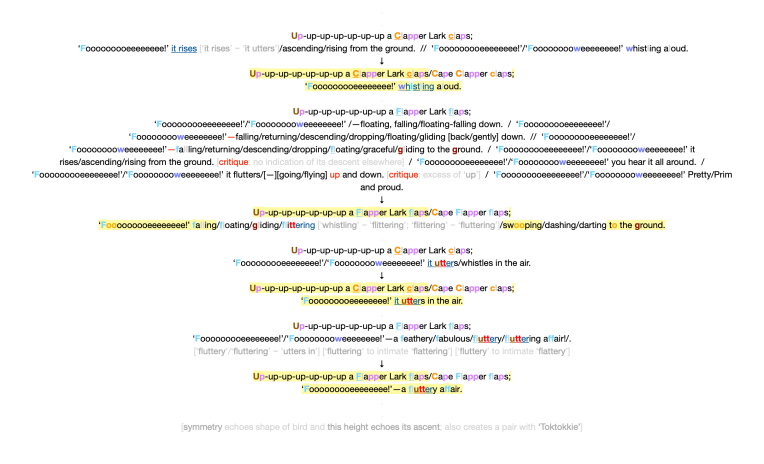
During the composition phase, I kept every version of every stanza of every poem as it evolved from sketch to poem in lengthy documents with tens of variations per stanza. My task is now to extract the final stanzas and assemble them as individual poems onto individual pages, which I can then arrange and rearrange.
Once I have done this, I can create the above-mentioned rudimentary booklet. It is with this draft volume that I shall work thenceforth to determine which poems to include, the order in which they should appear and so forth. For so long have the stanzas existed only on the screen; at last, they take physical form!
One More Poem
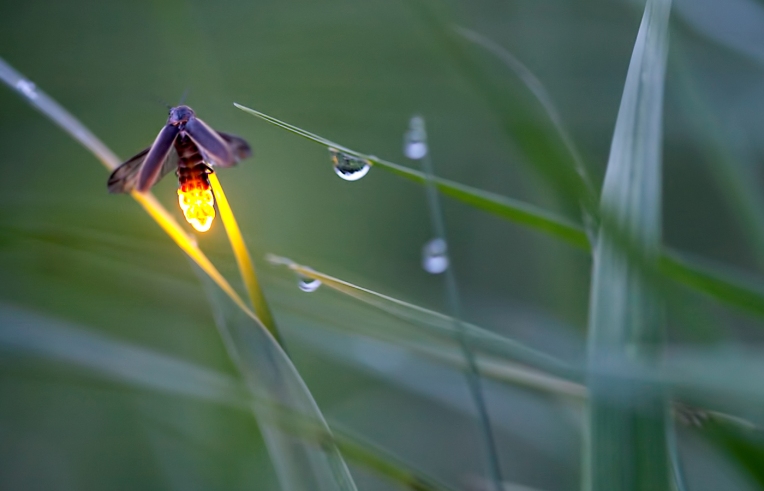
Revisiting ‘The Kleinrivier at Klipdrift’
The poems ‘Boy’1 and ‘The Last Time I Saw Fireflies’ are complete. This would have marked the conclusion of the composition period, but my interest in the previously abandoned Afrikaans draft of ‘The Kleinrivier at Klipdrift’,2 titled ‘Die Kleinrivier by Klipdrift’,3 was suddenly revived after its stanzas came to me, virtually complete, one morning on the hills of South Limburg (The Netherlands) a few weeks ago.
- Developed under the working title ‘Boys’.
- Kleinrivier [claynRhfeeR] (trilled [R]) is Afrikaans for ‘little-river’, a river; and Klipdrift [klipdRift] (trilled [R]), Afrikaans for ‘stone-ford’ or ‘Stanford’, a farmland area.
- Pronounced [di claynRhfeeR bay klipdRift] with the [i] in ‘did’, a trilled [R] and for ‘klipdrift’, both instances of [i] as the [e] in ‘folded’.
Therefore, I shall compose the Afrikaans version after all, doing so under the working (and likely final) title, ‘Die Kleinrivierliedjie’.3 The Afrikaans expresses the diminutive of ‘The Little River Song’ (thus, ‘the little Little River song’) and is at once a reflection of the lyric nature and structure of the poem and a homage to ‘Die Oukraalliedjie’, an Afrikaans folk song dear to my heart.
- Pronounced [di claynRhfeeRlikki] (with the [i] in ‘did’) and a trilled [R].
As a result of the Afrikaans title, I have changed the title of the English version of the poem (‘The Kleinrivier at Klipdrift’) to the corresponding ‘The Little River Song’. I enjoy its double meaning: ‘little’ reflecting both the name of the river and the brevity of the poem or ‘song’. ‘Die Kleinrivierliedjie’ will occupy me for the next few weeks, at the completion of which the editing process of the anthology will finally begin.
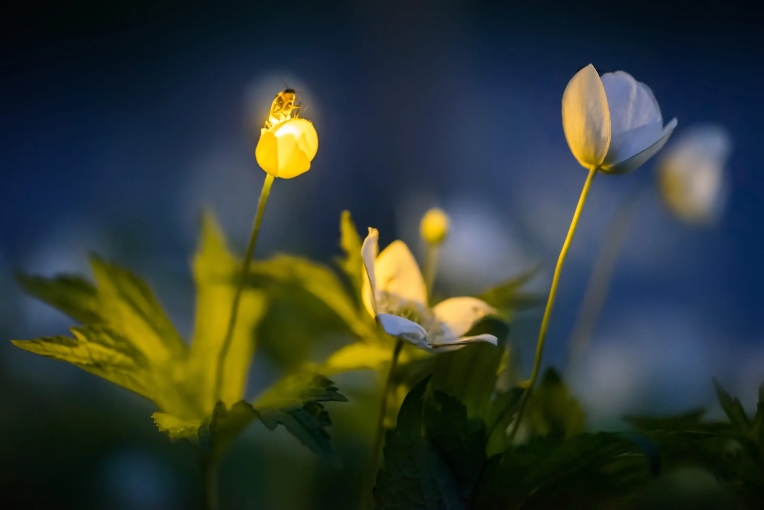
On ‘Boy’ and ‘The Last Time I Saw Fireflies’
A montage of childhood memories, the original draft of ‘Boys’ recalled happy adventures in the countryside with my best friend Bradley: riding bicycles on dirt roads, picking pears from an old pear tree, watching clouds from the wayside; however, when I considered the sense of isolation I felt, even in those happier moments, it seemed more fitting to write from that perspective, and thus ‘Boys’ became ‘Boy’.
The poem has three short trochaic stanzas that move swiftly through the boyhood scenes described above. The lines are perhaps the most clear, concise and uncomplicated I have achieved yet, capturing the simplicity of that time. Somewhat more complex is ‘The Last Time I Saw Fireflies’, a four-stanza recollection of my encounter with those magical creatures as a six or seven-year-old.
It was the first numinous moment of my life—though at the time, I was too young to grasp it. I was camping with my family at the beach, rather appropriately, during a church gathering. I wandered about the site and saw in the darkness of a shrub the light of fireflies. Deeply impressed, I quietly marvelled at the sight. The poem attempts to wrap in words my naive wonder—the experience in nature of the divine.
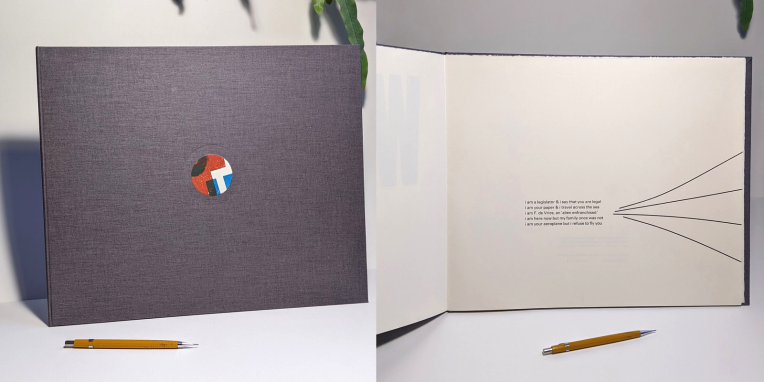
Publishing the Poems
Progress on the poems has been slow, but this year, I intend to assemble a chapbook, that is, a rudimentary booklet to distribute for scrutiny amongst followers of my work. As one writes, one becomes so deeply involved in the process that one misses obvious errors, obscurities and superfluities. A chapbook is the ideal way to identify and address such shortcomings and improve the verse where it is wanting.
It will also give me a sense of how the poems fit together as a collection: whether it is best to include the full set of fifty-two compositions or a selection, whether they are best arranged chronologically (by date composed or completed) or thematically (by subject matter, for example, ‘flowers’ and ‘birds’) and whether it is best to present one poem per page or per double-page spread.
Also to be decided is the title. I have narrowed down my options to Idylls, Odes and Over the Mountain. The first two describe my genre, lyric nature poetry, and the third is the title of a poem in the collection about the Overberg,5 the region that inspired it. Both approaches appeal to me. ‘Over the Mountain’ and Other Idylls (or Odes) is another option, in the style of Toon van den Heever’s Eugene en Ander Gedigte.6
- The Overberg (pronounced [oohuhfeR-behRCH] with a trilled [R] and the guttural [CH] in ‘loch’) is Afrikaans for ‘over-mountain’, a reference to its location beyond the Hottentots Holland mountain range, its natural border with the Cape Town region.
- ‘Eugene and Other Poems’, the reworked title of the South African Afrikaans poet’s first anthology, originally titled Gedigte. Eugene en Ander Gedigte is pronounced [yoogene en undeR CH’h-diCHtih] with a trilled [R], the guttural [CH] in ‘loch’ and the [i] as the [e] in ‘folded’).
